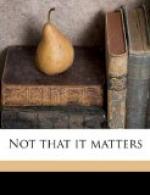It is, of course, true that we can be intemperate in eating as well as in drinking, but the results of the intemperance would appear to be different. After a fifth help of rice-pudding one does not become over-familiar with strangers, nor does an extra slice of ham inspire a man to beat his wife. After five pints of beer (or fifteen, or fifty) a man will “go anywhere in reason, but he won’t go home”; after five helps of rice-pudding, I imagine, home would seem to him the one- desired haven. The two intemperances may be equally blameworthy, but they are not equally offensive to the community. Yet for some reason over-eating is considered the mark of the beast, and over-drinking the mark of rather a fine fellow.
The poets and other gentlemen who have written so much romantic nonsense about “good red wine” and “good brown ale” are responsible for this. I admit that a glass of Burgundy is a more beautiful thing than a blancmange, but I do not think that it follows that a surfeit of one is more heroic than a surfeit of the other. There may be a divinity in the grape which excuses excess, but if so, one would expect it to be there even before the grape had been trodden on by somebody else. Yet no poet ever hymned the man who tucked into the dessert, or told him that he was by way of becoming a jolly good fellow. He is only by way of becoming a pig.
“It is the true, the blushful Hippocrene.” To tell oneself this is to pardon everything. However unpleasant a drunken man may seem at first sight, as soon as one realizes that he has merely been putting away a blushful Hippocrene, one ceases to be angry with him. If Keats or somebody had said of a piece of underdone mutton, “It is the true, the blushful Canterbury,” indigestion would carry a more romantic air, and at the third helping one could claim to be a bit of a devil. “The beaded bubbles winking at the brim”—this might also have been sung of a tapioca-pudding, in which case a couple of tapioca- puddings would certainly qualify the recipient as one of the boys. If only the poets had praised over-eating rather than over-drinking, how much pleasanter the streets would be on festival nights!




